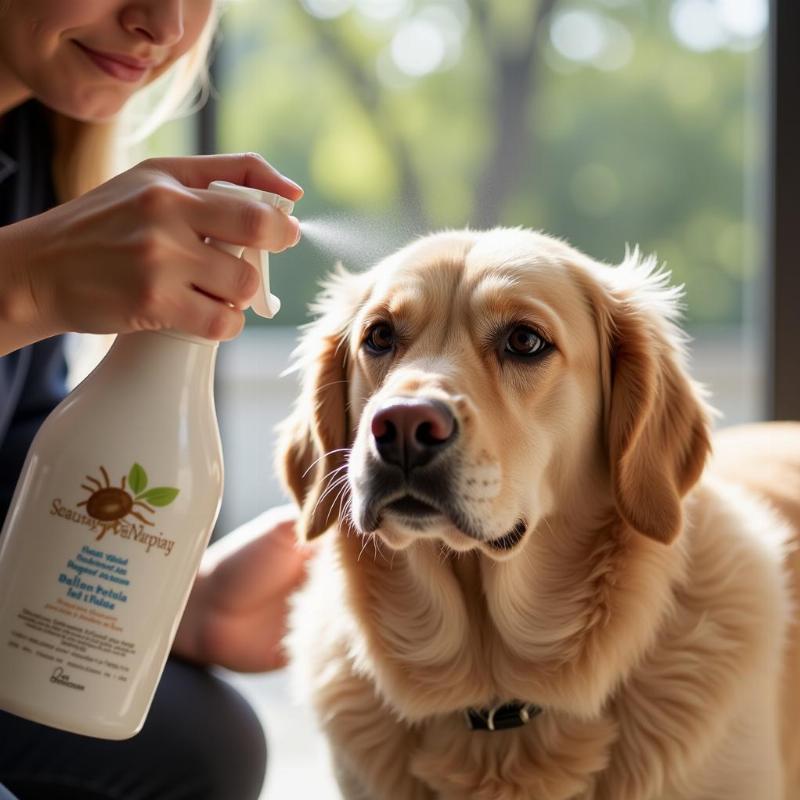Flea and tick spray for dogs is a crucial part of pet care in the US, offering a convenient way to protect your canine companion from these pesky parasites. Choosing the right product can be overwhelming, with a variety of options available. This comprehensive guide will help you navigate the flea and tick spray landscape, ensuring your dog stays healthy and parasite-free.
Understanding the Importance of Flea and Tick Control
Fleas and ticks aren’t just annoying; they can transmit serious diseases to your dog, such as Lyme disease, Rocky Mountain spotted fever, and ehrlichiosis. Regular use of flea and tick spray for dogs is a preventative measure recommended by veterinarians across the US, aligning with American Kennel Club guidelines for responsible dog ownership. Protecting your dog also safeguards your family, as some tick-borne illnesses can affect humans too.
Types of Flea and Tick Sprays for Dogs
Navigating the various types of flea and tick spray for dogs can be confusing. Understanding the active ingredients and their effectiveness is key to making an informed decision.
Chemical Sprays
These sprays typically contain synthetic pyrethroids, which are effective at killing fleas and ticks on contact. While generally safe when used as directed, some dogs may be sensitive to these chemicals. Always follow the product instructions carefully. Popular brands like Frontline and Adams offer a range of chemical sprays tailored for dogs of different sizes and ages.
Natural Sprays
For owners seeking a more natural approach, several plant-based flea and tick sprays are available. These often contain ingredients like essential oils, which can repel parasites. While generally considered safer than chemical options, their effectiveness can vary. Always consult your veterinarian before using natural flea and tick spray for dogs, especially if your dog has any underlying health conditions.
 Natural Flea and Tick Spray for Dogs
Natural Flea and Tick Spray for Dogs
Choosing the Right Flea and Tick Spray for Your Dog
With so many flea and tick spray for dogs options on the market, selecting the right one can be daunting. Consider the following factors:
- Your Dog’s Age and Size: Puppies and smaller dogs require different formulations than adult dogs. Always choose a product specifically designed for your dog’s age and weight.
- Sensitivity: If your dog has sensitive skin, opt for a hypoallergenic or natural formula.
- Lifestyle: If your dog spends a lot of time outdoors, you may need a stronger and longer-lasting spray.
- Veterinarian Recommendations: Consult your veterinarian for personalized recommendations based on your dog’s breed, health, and lifestyle. They can advise you on the best flea and tick spray for dogs for your specific situation.
How to Apply Flea and Tick Spray for Dogs
Proper application is essential for the effectiveness of flea and tick spray for dogs. Follow these steps:
- Read the Instructions: Carefully read the product label before applying.
- Protect Yourself: Wear gloves and apply the spray in a well-ventilated area.
- Apply Evenly: Hold the spray bottle a few inches away from your dog’s coat and apply evenly, ensuring coverage from head to tail.
- Avoid the Eyes and Face: Be careful not to spray the product directly into your dog’s eyes or face.
- Dry Thoroughly: Allow the spray to dry completely before allowing your dog to interact with other pets or children.
Frequently Asked Questions
- How often should I apply flea and tick spray for dogs? Most sprays require reapplication every 30 days, but always follow the product instructions.
- Can I use flea and tick spray for dogs on cats? No, never use dog flea and tick spray on cats. Cats are highly sensitive to certain ingredients commonly found in dog products.
- What should I do if my dog has a reaction to flea and tick spray? If your dog experiences any adverse reactions, such as itching, redness, or vomiting, discontinue use immediately and contact your veterinarian.
- Are natural flea and tick sprays as effective as chemical sprays? While natural sprays can be effective, their efficacy can vary. Consult with your veterinarian for recommendations.
- Can I use flea and tick spray for dogs if my dog is pregnant or nursing? Consult your veterinarian before using any flea and tick product on a pregnant or nursing dog.
Conclusion
Protecting your dog from fleas and ticks is essential for their health and well-being. Flea and tick spray for dogs offers a convenient and effective solution. By understanding the different types of sprays available and following the proper application guidelines, you can ensure your furry friend stays protected from these pesky parasites. Remember to consult with your veterinarian for personalized recommendations.
Expert Insight: “Regular flea and tick prevention is a cornerstone of responsible pet ownership,” says Dr. Emily Carter, DVM, a leading veterinarian in New York. “Flea and tick sprays can provide excellent protection, but it’s crucial to choose a product that’s right for your individual dog.”
“Choosing the correct flea and tick spray for dogs is not a one-size-fits-all approach,” adds Dr. Sarah Miller, DVM, a veterinary dermatologist in California. “Factors like breed, lifestyle, and sensitivity should all be considered.”
Related Articles:
- frontline flea and tick spray for dogs
- adams flea and tick spray for dogs
- natural flea and tick spray for dogs
- flea and tick spray for dogs
Beautdogs.us is your premier resource for all things dog-related in the US. We offer expert advice on dog breeds, grooming, training, and overall wellness. Whether you’re a new dog owner or a seasoned pro, Beautdogs.us is your trusted source for comprehensive and engaging information on dog care and companionship. Contact us today for personalized guidance! Email: [email protected], Phone: +1 501-555-7529. Visit us at Beautdogs.us!